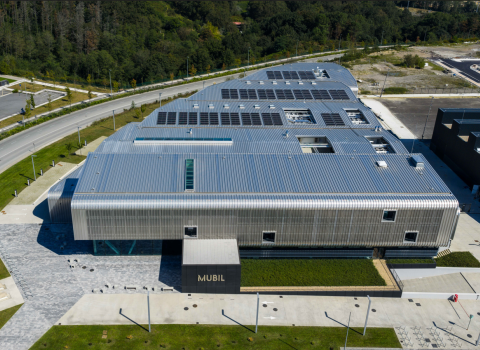Europe is at a disadvantage in attracting investments in green technology, with high risks and a lack of certainty deterring investors

A panel discussion on financing net-zero at the EU Industry Days 2023. From left to right: Frederic Lucenet, global head of manufacturing and services at the European Bank for Reconstruction and Development; Ricardo Mourinho Félix, vice-president of the European Investment Bank; José Carlos García de Quevedo, president of the Instituto de Crédito Oficial; Elena Bou, innovation director of EIT InnoEnergy; Nicolas Brien, chairman of the European Startup Network
Regulatory delays and difficulties accessing private finance are holding back Europe’s green tech industry, entrepreneurs are warning.
“It’s very difficult for companies to justify investing in Europe relative to the US,” said Ester Baiget, CEO of Danish biotech Novozymes, speaking at the annual EU Industry Days conference in Malaga last week.
Baiget pointed to the “more movable labour market” in the US, and to regulations which accelerate the implementation of new technologies, making it easier to raise funds as the return on investment is faster. The subsidies provided by the Inflation Reduction Act (IRA) are another factor drawing companies across the Atlantic.
“It is not only about more money, but simplicity and speed in deployment,” said Elena Bou, co-founder of the EU-supported innovation network EIT InnoEnergy, contrasting the EU’s slow deployment with the efficiency of the IRA. “In one year, [the US has] been able to implement $110 billion in cleantech investments. In Europe, it takes a lot more time.”
When European Commission President Ursula von der Leyen launched the Green Deal in 2019, she promised to transform European industry to meet the challenges of climate change. But the impact has been slow in coming. In her recent State of the Union address, von der Leyen said the EU is finally ready to move into the industrial phase of the plan.
Bou said part of the reason it has taken four years for the Green Deal to make an impact is the difference in permitting speeds. For renewable energy projects, “it takes years in Europe to get permission; in the US it takes one or two months,” she said.
This is something the EU is aiming to address with the Net Zero Industry Act, which would simplify and accelerate the permitting process for net-zero manufacturing projects.
Bou also highlighted the challenges companies face raising money, particularly for so-called ‘tough tech’ – transformative technologies, such as nuclear fusion, where the large investment and significant technological risks deter investors.
Green technologies provide new challenges for venture capitalists, who are used to simple investments in software, said Nicolas Brien, chairman of the European Startup Network. “We’re not trying to build another Google, but very complex businesses, with sometimes exotic business models that venture capitalists don’t like,” he said.
Brien, who recently founded a waste management company, said that even more important than facilitating investment is making sure green tech startups have access to public procurement. Here, too, there are exemplars in the US. “It’s not something we’ve cracked this side of the Atlantic. The amount of public tenders that go to innovative SMEs and startups is incredibly low.”
Critical aspects
While inscribing the net zero targets in EU law provides a degree of certainty for investors, tenders are also a critical aspect, said Bou. As things stand, there problems in the way tenders are drawn up for wind energy and solar panels. “The tenders are purely about cost, not about sustainability, recyclability or circularity. The European players often lose these tenders because they are betting on sustainability and circularity,” she said.
Ricardo Mourinho, vice president of the European Investment Bank told the meeting the bank can play an important role. “We have very patient shareholders, and can therefore take a longer-term perspective. And we bring a risk-sharing capacity, looking into projects which for the private sector are simply too risky,” he said. EIB investment can work as a quality stamp, which in turn attracts private investors.
Technology for decarbonising the economy is not inherently attractive to long-term investors, noted Kerstin Jorna, director general for Internal Market, Industry, Entrepreneurship and SMEs at the European Commission. The Commission is working to address this through its InvestEU investment fund. “By definition, these solutions are new and risky. The debate from the industry side and around InvestEU has shifted to de-risking, rather than just throwing [in] capital,” she said.
There will also need to be a shift in the way savings and pensions are invested, away from investment in property, said Michiel Scheffer, president of the European Innovation Council. “The challenge is to invest in the jobs of the future, because it’s only the jobs of the future that will pay the pensions. Bricks don’t pay pensions.”





 A unique international forum for public research organisations and companies to connect their external engagement with strategic interests around their R&D system.
A unique international forum for public research organisations and companies to connect their external engagement with strategic interests around their R&D system.